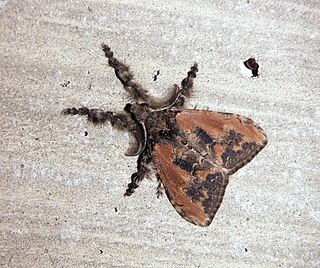
The feathered thorn is a moth of the family Geometridae. It was first described by Carl Linnaeus in 1761.

The archdukes are a genus, Lexias, of tropical forest-dwelling butterflies that are common throughout Southeast Asia and Australasia. Members of the brush-footed butterfly family Nymphalidae, the genus is represented by about 17 species. Two very similar and coexisting genera are Tanaecia and Euthalia, the latter previously including some Lexias species. The largest species reach a wingspan of about 10 cm (4 in).

Gomalia is a monotypic genus of hesperiid butterfly.Gomalia elma, the marbled skipper or African marbled skipper, is found in Africa and parts of Asia.

Dasychira mendosa, the brown tussock moth or hairy tussock moth, is a moth of the family Erebidae. The species was first described by Jacob Hübner in 1823. It is found in India, Bangladesh, Sri Lanka, Indonesia, Taiwan, Thailand and Australia.

Diloba caeruleocephala, the figure of eight, is a moth of the family Noctuidae. It is found in the Palearctic.

Diaphora mendica, the muslin moth, is a moth of the family Erebidae. It is found in the Palearctic ecozone east to Lake Baikal.

Eudocima phalonia, the common fruit-piercing moth, is a fruit piercing moth of the family Erebidae. The species was first described by Carl Linnaeus in his 1763 Centuria Insectorum. It is found in large parts of the tropics, mainly in Asia, Africa and Australia but introduced into other areas such as Hawaii, New Zealand and the Society Islands. It is one of major fruit pests in the world.

Charaxes varanes, the pearl emperor, Karkloof emperor, or pearl charaxes, is a butterfly of the family Nymphalidae, found in Africa from Saudi Arabia to South Africa.

Mimoides ariarathes is a species of butterfly in the family Papilionidae. It is native to South America.
Eugnosta brownana is a species of moth of the Tortricidae family. It is found in Texas, New Mexico, Arizona and possibly Mexico.
Ditrigona chama is a moth in the family Drepanidae. It was described by Wilkinson in 1968. It is found in China.
Ditrigona sericea is a moth in the family Drepanidae. It was described by Leech in 1898. It is found in China, Burma and north-eastern India.
Ditrigona mytylata is a moth in the family Drepanidae. It was described by Achille Guenée in 1868. It is found in northern India and Myanmar.

Teldenia specca is a moth in the family Drepanidae. It was described by Wilkinson in 1967. It is found in the north-eastern Himalayas and from western China to Borneo, Sumatra, Palawan, Buru and New Guinea.
Teldenia desma is a moth in the family Drepanidae. It was described by Wilkinson in 1967. It is found in New Guinea.
Teldenia ruficosta is a moth in the family Drepanidae. It was described by Warren in 1922. It is found in West Papua.
Teldenia illunata is a moth in the family Drepanidae. It was described by Warren in 1907. It is found in New Guinea.
Teldenia niveata is a moth in the family Drepanidae. It was described by Pagenstecher in 1896. It is found on Sulawesi.
Erechthias beeblebroxi is a moth of the family Tineidae. It is endemic to Australia, where it has been recorded from Queensland.
Megalopyge braulio is a moth of the Megalopygidae family. It was described by Schauss in 1924. It is found in Paraguay.












